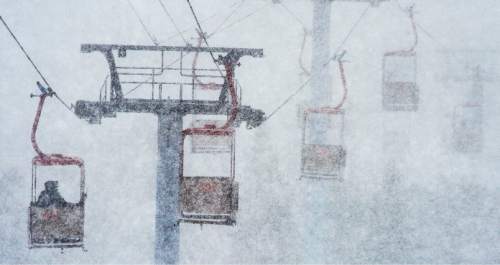This is an archived article that was published on sltrib.com in 2016, and information in the article may be outdated. It is provided only for personal research purposes and may not be reprinted.
Vail Resorts firmly established itself as the dominant force in North American skiing Monday, revealing that it is buying Whistler Blackcomb in British Columbia for nearly $1.1 billion.
Vail already had the continent's second largest ski area in Park City Resort, which covers 7,300 skiable acres on 300 trails. Now it has added the biggest — Whistler Blackcomb's two mountains feature 8,171 acres of skiing on 200-plus runs.
The two resorts also share an Olympic pedigree. Park City played a key role in the 2002 Winter Games while Whistler Blackcomb was the site of most skiing events at the 2010 Vancouver Olympics.
"Whistler Blackcomb is one of the most iconic mountain resorts in the world, with an incredible history, passionate employees and a strong community," said Vail Resorts Chairman and CEO Rob Katz.
His aggressive expansion of Vail's ownership portfolio will cost about $513 million in cash plus stock considerations valued at $543 million.
In the past five years, Vail was brought into Utah by Talisker Corp. to manage Canyons Resort. After Powdr Corp. failed to renew a lease for Park City Mountain Resort with Talisker and was losing a court battle to overturn that mistake, Vail bought the resort's base facilities for $182 million and combined that resort with Canyons last season.
Vail also has added resorts in Australia, Minnesota and Michigan, creating a mass of Epic Pass holders who can use that relatively cheap season ski pass as justification for visiting other Vail resorts and spending money at their hotels and restaurants.
The Epic Pass will not be in play for Whistler Blackcomb skiers and boarders until the 2017-18 season.
Katz pledged to "build upon the guest experience at Whistler Blackcomb while preserving the unique brand and character of the resort as an iconic Canadian destination for guests around the world."
Bill Malone, president and CEO of the Park City Chamber of Commerce/Convention and Visitors Bureau, is eager to see how Vail's acquisition of Whistler Blackcomb will affect Summit County, but he's confident it will be positive.
"It shocked me when I read about it at breakfast. I wasn't expecting this," he said. "I've been getting a lot of emails today that just say 'Wow.' "
Research from Malone's agency a couple of years ago showed that Canadian skiers were loyal to resorts within their country and not prone to venture into the U.S. for trips.
Vail's ownership of Whistler Blackcomb may change that, Malone said. "Canadian [Epic] passholders now will have an opportunity to ski in the U.S. at resorts that are different from what they're used to, especially from a snow standpoint."
He hopes to get a better feel for the Epic Pass impact on Park City this winter, the first in which it might draw large numbers of Australians tied into the system through Vail's purchase a year ago of Perisher Resort, which is about halfway between Sydney and Melbourne.
"We expect to see some energy come out of that relationship this winter," Malone said. "At a ski show down there in May, there was a lot of buzz about the opportunity to ski multiple areas in [North America]. Whistler just adds to that."
He is particularly optimistic that the Whistler Blackcomb connection could expose Park City to more Asian tourists who have direct flights to Vancouver, 78 miles from Whistler Blackcomb.
"These acquisitions [by Vail] add a whole new complexity" to Park City's marketing scheme, Malone added. "What are the hot spots where Whistler has a loyal following? Can we squeeze into those markets? I can't help but think so."
Ski Utah President Nathan Rafferty sees definite promise in the purchase.
"Vail's acquisition of Whistler makes perfect sense," said Rafferty, head marketer for Utah's 14 resorts and its $1.1 billion-a-year ski industry. "Vail is a leader in resort operations, and Whistler is one of the premier mountain destinations in the world. I'm sure this deal will only serve to strengthen North America's winter sports industry."
Dave Brownlie, Whistler Blackcomb's chief executive, said the merger will bolster his resort's financial strength and marketing exposure.
"This relationship will bring greater resources to support our current operations and our ambitious growth plans, including the Renaissance project, the most exciting and transformative investment in Whistler Blackcomb's history," Brownlie said.
He was referring to a $300 million multiyear project to revitalize Blackcomb's base area with town homes, a luxury boutique hotel, a four-season adventure center and nonskiing outdoor activities. Mountain improvements also are planned, including new lifts, restaurants and snowmaking.
The acquisition impressed Wall Street.
Vail Resorts' stock rose 11.49 points, or 8 percent, to $155.46. Shares of Whistler Blackcomb Holdings also went up 11.49 points, but that represented a 45.7 percent jump in its stock price to $36.63 Canadian dollars per share.



